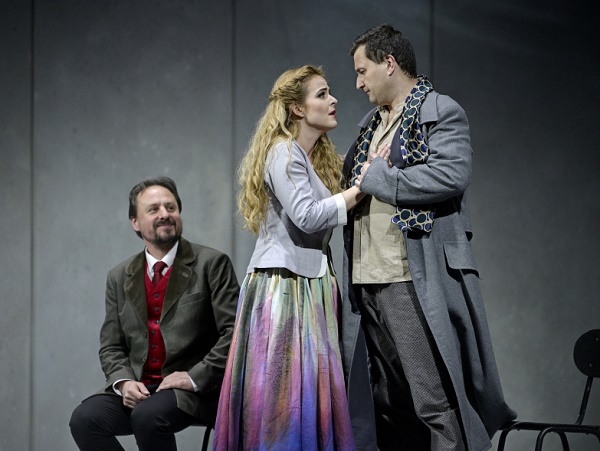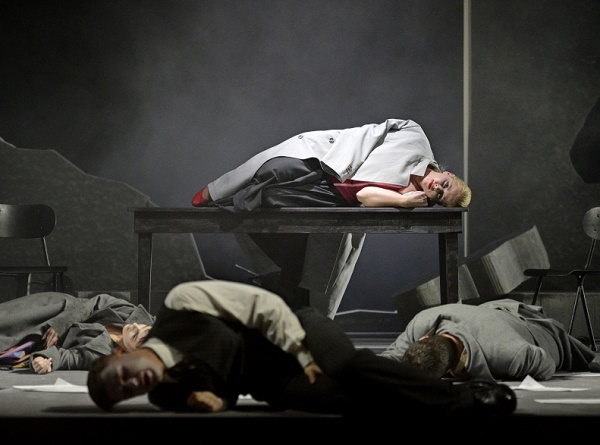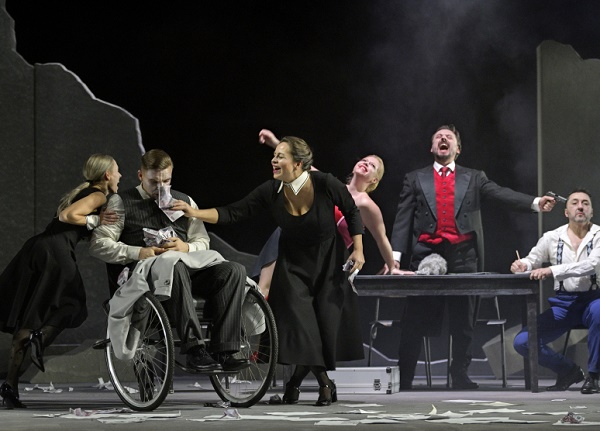OSTRAVA: ULLMANN DOUBLE BILL AS A SEQUEL OF THE TEREZÍN OPERA CYCLE AT THE NATIONAL MORAVIAN-SILESIAN THEATRE
One-act operas THE BROKEN JUG (Der zerbrochene Krug) and THE EMPEROR OF ATLANTIS OR DEATH’S REFUSAL (Der Kaiser von Atlantis oder Die Tod-Verweigerung) by Viktor Ullmann (1898-1944), a native of Těšín, will open as a double bill at the National Moravian-Silesian Theatre, Ostrava, on 16 February 2023. The production is another contribution to the TEREZÍN OPERA CYCLE, which the Ostrava theatre launched last year with Krása’s Betrothal in a Dream and which aims to commemorate the artistic legacy of the composers who fell victim to the Nazi regime.

The broken Jug. Copyright: Martin Popelar
“In addition to their unquestionable and inspiring artistic quality, staging Krása, Ullmann, and Haas should be perceived as a partial repayment of the debts and injustices of the recent past. It is also intended to present the composers and their works as part of the diverse cultural background of inter-war Czechoslovakia, which was subsequently oppressed by two totalitarian regimes—Nazism and Communism—resulting in their death and fall into oblivion,” mentions Jiří Nekvasil, the NMST’s intendant.

The broken Jug. Copyright: Martin Popelar
The two operas share a similar theme, but they differ in their origin. While The Broken Jug was written to a libretto based on an 1806 comedy by Heinrich von Kleist shortly before the composer’s deportation in 1942, The Emperor of Atlantis was written around 1943 right in the Theresienstadt ghetto and was intended for the interned artists of the time. Reportedly, The Emperor of Atlantis was composed to the libretto by one of Ullmann’s fellow prisoners, however, some sources mention that Franz Peter Kien collaborated with Ullmann, while others mention only Ullman as the author.

Emperor of Atlantis. Copyright: Martin Popelar
The desire for power and the abuse of social systems is the common theme of both operas. While The Broken Jug is an example of corrupt, decadent justice, the grotesque Emperor of Atlantis is about the abuse of political power situations that can lead to absurd wars.
Another connecting element is the postponed Czech premiere of the operas, which took place long after the war in the 1990s. Surprisingly enough, The Emperor of Atlantis has become one of the world’s most-performed Czech operas since its opening night in Amsterdam in 1975. The Broken Jug premiered in Dresden in 1996 and will be given its Czech premiere in the NMST.
Unlike the previous productions, whether in Czechia or abroad, both new pieces in the NMST’s programming are performed in the Czech translation by Czech singer-songwriter and librettist Jaromír Nohavica.

Emperor of Atlantis. Copyright: Martin Popelar
The Ullmann double bill is directed and designed by the Slovenian stage director and set designer Rocc. The sets in both operas are mostly spare and simple and complemented by striking elements or video projections, which suitably underscore the storylines. “Despite the difficult subject and fate, the composer believed in hope, in humanity. Both operas are thus not only a mirror of human society but also give hope that the future can be better and brighter,“ says Rocc.
The production is conducted by Jakub Klecker/Maroš Potokár, having costumes designed by Belinda Radulović. Both title roles—judge Walter in The Broken Jug and Emperor Überall in The Emperor of Atlantis—are portrayed by Boris Prýgl.
Viktor Ullmann was born in 1898 in what is now the Polish part of Těšín. After the dissolution of the monarchy, Ullmann settled in Prague, spending most of his professional life at the New German Theatre (today’s Prague State Opera) as an accompanist, choirmaster, and second bandmaster. The Museum of Těšín has created an exhibition on Ullmann’s life and oeuvre, which can be seen in the upper foyer of the Antonín Dvořák Theatre until the end of this season. In addition to the composer and his native region, there is the international Viktor Ullmann Festival organised as a biennial by the city of Těšín since 2018.
Besides ranking among the NMST’s Terezín Opera Cycle, the Ullmann double bill belongs to Prague National Theatre’s four-year project Musica non grata, which focuses more extensively on the artistic legacy of the composers persecuted during the war years for political, racial or gender reasons. In pursuance of the project, Ullmann’s operas will be performed on 4 February 2024 in the Estates Theatre in Prague. The cooperation is financially supported by the Embassy of the Federal Republic of Germany in Prague.
The final part of the Terezín Opera Cycle will be Pavel Haas’s opera The Charlatan, scheduled for the 2024/2025 season. The cycle’s culmination is the NMST’s second major contribution to the Year of Czech Music established in 1924 and celebrated each decade. “In this case, the number four appears also in the year 1944, when all three composers were murdered, and thus is a tragic reminder of the violent liquidation of the Czech cultural elite. I think that is also an aspect to reflect on during the celebrations,” concludes Jiří Nekvasil.

